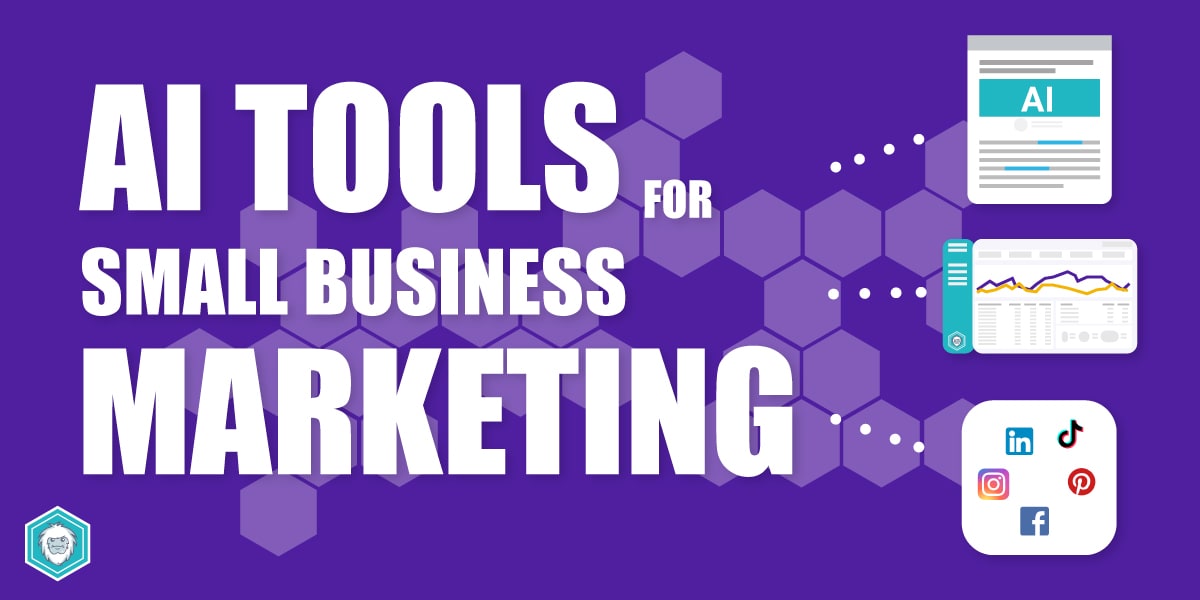AI for Small Business Marketing: Tools and Tips
Small businesses have the potential to harness Artificial Intelligence (AI), to help them not only compete with larger companies but also save time and keep budgets in check.
AI can help in small business marketing by automating repetitive tasks, analyzing ROI and help make workflows more efficient.
AI tools are not just tools, they are empowerment for small businesses, enabling them to stand toe-to-toe with larger organizations.
In this guide, we’ll delve into the top AI tools, provide actionable tips, and share strategies specifically designed for small business marketing. By the end, you’ll be equipped with practical knowledge to implement these strategies in your business.

Why Small Businesses Need AI in Marketing
Small businesses often operate with limited resources, making efficiency and cost-effectiveness essential. AI tools streamline operations, provide data-driven insights, and improve customer experiences.
Here’s why small businesses should embrace AI:
- Cost Savings: AI-powered tools automate tasks like content creation, email marketing and posting social media at the optimum times, in turn helping reduce labor costs.
- Improved Targeting: AI analyzes consumer behavior and demographics to help create hyper-targeted campaigns.
- Enhanced Personalization: Tools like AI chatbots and predictive analytics ensure a tailored customer journey.
- Data-Driven Decisions: AI platforms provide actionable insights, enabling informed decision-making.
Top AI Tools for Small Business Marketing
1. HubSpot (CRM and Marketing Automation)
HubSpot’s AI-powered marketing tools provide an intuitive solution for managing customer relationships and automating marketing tasks.
Beyond email automation, customer segmentation, and in-depth analytics, HubSpot integrates seamlessly with other platforms to unify your marketing efforts. For small businesses, its free CRM is a powerful gateway into AI-driven marketing.

Key Features:
- Automated email campaigns and follow-ups.
- Predictive lead scoring to prioritize prospects.
- AI-driven insights for improving customer engagement.
- A vast library of free educational resources to support small businesses.
2. Jasper (AI Content Creation)
Jasper is an Ai content creation tool that comes with the ability to create professional, engaging content with ease. It uses natural language processing (NLP), which helps to generate tailored marketing copy, blog posts, and social media captions designed to resonate with your audience.
Whether you’re looking to streamline your content creation process or craft compelling marketing materials, Jasper provides the tools to elevate your brand’s messaging. By reducing the time and effort needed for writing, Jasper enables you to focus on other critical strategies to grow your business while ensuring your content remains impactful and audience-focused.

Jasper’s flexibility extends to supporting multiple languages while offering suggestions for improving existing content, much like how Grammarly can check for AI text & plagiarism.
Key Features:
- AI-generated content based on simple prompts.
- Tone and style customization.
- Templates for ads, emails, and SEO content.
- Multilingual support for global audiences.
3. Canva (Design Made Simple)
Canva’s AI-powered platform revolutionizes visual content creation, enabling businesses to produce stunning designs without requiring professional expertise.
With user-friendly tools and templates, Canva simplifies the design process for everything for social media graphics, presentations and video editing. Its collaborative features allow teams to work together in real-time, boosting efficiency and productivity.
Whether you’re a small business or a growing team, Canva empowers you to create impactful visuals that align with your brand and captivate your audience, all while streamlining workflows and saving valuable time.

Key Features:
- Magic Resize for multi-platform designs.
- AI-based design suggestions.
- Templates for social media, presentations, and more.
- Collaboration tools for team projects.
4. Drift (Conversational Marketing)
Drift’s conversational marketing platform combines the power of chatbots with AI-driven customer insights to deliver exceptional real-time engagement.
It personalizes interactions, helping businesses connect with potential customers in meaningful ways while driving conversions. Additionally, Drift includes robust analytics to track and measure the effectiveness of your conversations, ensuring your strategies are data-driven and optimized for success.

Key Features:
- AI-powered chatbots that answer FAQs and qualify leads.
- Real-time customer engagement.
- Integrations with CRMs and email tools.
- Analytics to optimize chatbot performance.
5. Hootsuite (Social Media Management)
Hootsuite provides an all-in-one solution for social media management for small businesses, making it easier to stay on top of multiple platforms.
Its intuitive interface allows you to schedule posts, monitor engagement, and track performance seamlessly. What sets Hootsuite apart is its AI-powered recommendations, which analyze your audience’s behavior to suggest the best posting times and content strategies.
This ensures your efforts are targeted and effective, maximizing engagement and reach. Whether you’re a small business owner managing social media alone or part of a larger team, Hootsuite’s tools are designed to save time and drive results.

Key Features:
- Automated post scheduling.
- AI-driven insights for posting times and content.
- Social listening to monitor brand mentions.
- Integration with multiple social platforms for streamlined management.
AI-Powered Marketing Tips for Small Businesses
1. Leverage Personalization
AI tools enable you to deliver highly personalized experiences, from product recommendations to tailored email campaigns. Platforms like ActiveCampaign can use customer data to create dynamic content that resonates with individual preferences.
2. Focus on Predictive Analytics
Understanding what your customers will do next is key to staying ahead. Predictive analytics tools like Pipedrive and Salesforce Einstein analyze historical data to forecast trends and customer behaviors, helping you allocate resources more effectively.
3. Automate Repetitive Tasks
Automation reduces the time spent on mundane tasks like scheduling social media posts, sending follow-up emails, or tracking campaign performance. AI-driven platforms like Zapier can integrate multiple tools, ensuring seamless workflows.
4. Embrace Chatbots
AI chatbots like ChatGPT can provide 24/7 customer support, answer questions, and guide users through your offerings, enhancing customer satisfaction while freeing up your team’s time.
5. Optimize for Voice Search
With more people using voice assistants, optimizing your website for voice search is crucial. Use conversational language in your content and include FAQs that align with how people speak rather than type.
Summing Up: You Need AI for Marketing
AI is no longer a luxury reserved for large corporations; it’s a powerful tool that small businesses can harness to grow and thrive.
By leveraging AI-driven tools like HubSpot, Jasper, Canva, and Drift, and implementing smart strategies like personalization and automation, small businesses can achieve significant marketing success.
Start small, focus on your specific needs, and watch as AI transforms your marketing efforts into a competitive edge.




